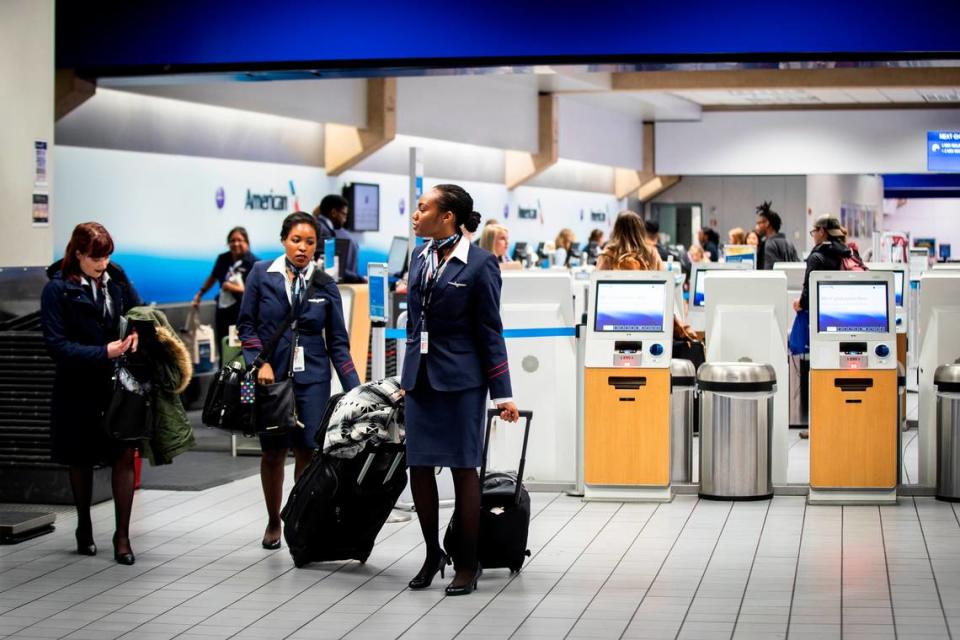Will American Airlines flight attendants strike? If so, when? What travelers should know.
In Reality Check stories, Star-Telegram journalists dig deeper into questions over facts, consequences and accountability. Read more. Story idea? RealityCheck@star-telegram.com.
Recent headlines have suggested that American Airlines flight attendants are moving “closer than ever” to a strike, after yearslong negotiations with the Fort Worth-based carrier have yet to yield a contract.
Last week, their union — the Association of Professional Flight Attendants — opened a “strike command center” at its headquarters in Euless, near Dallas-Fort Worth International Airport. The union said it has started advising its members to consider saving money and moving medical appointments, and its website has a strike handbook posted.
A strike would disrupt air travel across the country, particularly at DFW — American’s biggest hub where 7,600 flight attendants are based and the airline has more than 900 daily flights at peak times.
If you have American Airlines tickets for a trip this summer or fall, should you be worried? How likely is it that flight attendants could walk off the job, and how soon could that happen?
Will American Airlines flight attendants strike? When?
Labor negotiations in the transportation industry are governed by the Railway Labor Act of 1926, which dictates a series of steps that parties must go through before a strike can happen.
“The Railway Labor Act is designed to very, very, very significantly minimize the possibility of a disruption to the transportation system,” said Steve Johnson, American Airlines’ vice chair and chief strategy officer, in an interview with the Star-Telegram. “It’s structured in a way for which there’s more oversight of collective bargaining.”
On Monday, the union and management resumed negotiations in Washington with the National Mediation Board.
The National Mediation Board could schedule additional days beyond this week for bargaining. But if it declares that this week’s negotiations have no path forward — an impasse — the union and the airline will be released into a 30-day “cooling-off” period, during which they can choose to continue negotiations. Flight attendants have already sought unsuccessfully to be released.
“We are not at the place, at the end of negotiations this week, where we’re looking at a strike of some kind right away,” said Gary Leff, a travel expert who runs the blog View from the Wing. “We’re looking at an increased chance that the National Mediation Board could authorize the parties to go into self help after 30 days, at which point they have the discretion, at some point to do so.”
What happens after those 30 days? The union’s members could take action. Or, the White House could intervene.
Under the law, President Joe Biden could declare that negotiations must continue.
It has happened before. In 1997, American Airlines’ pilots union called a strike after rejecting a final proposal from management. President Bill Clinton stepped in within minutes, enacting the seldom-used power to create a Presidential Emergency Board.
That board has 30 days to come up with recommendations for how the dispute should be handled, and both sides would then have 30 days to consider them.
If the parties still can’t reach an agreement during that time, only then could the flight attendants go on strike.
But would Biden intervene? It would be a politically fraught decision. He may be reluctant in an election year to anger labor unions who support him and harm his image with that voting bloc before November. Not intervening, though, would cause a transportation crisis.
However, it’s rare for negotiations to ever reach that stage.
“[The process] has resulted in, for American Airlines and its merger constituents… more than 40 agreements since 2005 without going further,” Johnson said.
The last time labor action resulted in a strike at a commercial carrier was in 2010, when Spirit Airlines pilots walked off the job for four days amid a wage dispute.
Johnson said Monday that American was “very confident” that both sides will be able to reach an agreement. A representative of APFA didn’t immediately respond to a request for comment.
The airline said in a statement Monday: “We continue to meet regularly with the APFA and recently increased our current offer to include an immediate 25% increase to flight attendant pay, which includes the addition of boarding pay. We’re ready to get a deal done quickly and are back at the negotiating table this week to do that.”
As negotiations roll into Thursday, the flight attendants union was preparing to picket.
“American Airlines flight attendants want and need a complete contract addressing all our concerns,” the union said in a statement last week. “We have a strike vote authorization of 99.47 percent, have picketed for months, and have demonstrated our resolve and solidarity. Our message has been crystal clear: we need an industry-leading contract.”


